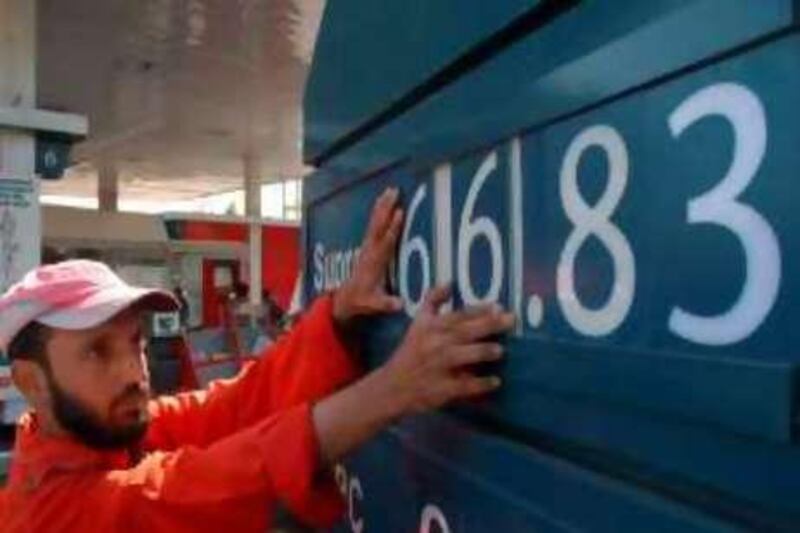The fall in oil prices, which yesterday dipped below $54 a barrel to a 22-month low, has cost Opec US$700 billion (Dh2.6 trillion) so far this year, the president of Opec said yesterday. The exporters' group, which is due to discuss output policy next week in Cairo, has already reduced output twice in the face of crumbling demand in recession-hit developed economies. Oil prices have fallen 63 per cent in the past four months. In remarks opublished yesterday in Algeria's Al Khaber newspaper, Chakib Khelil, the Opec resident and Algerian energy minister, said Opec was concerned about the worsening global economic situation. "All [Opec] members are aware of the importance of the situation and the need to ensure market stability," he said. Based on its 15 per cent share by value of Opec's total exports last year, the UAE may have lost more than $100bn due to the oil-price slide. Mr Khelil's remarks followed the release of a US government estimate that Opec members collected $884bn in oil-export revenues in the first 10 months of this year, or 32 per cent more than the $670bn they earned for the whole of last year. However, the US Energy Information Administration sharply cut its forecast for revenues for all of this year to $979bn from $1.2 trillion. It issued the earlier projection in mid-August, about a month after oil prices began their precipitous drop from their record of $147.27 a barrel on July 11. In electronic trading on the New York Mercantile Exchange yesterday, crude oil for December delivery fell 2 per cent to $53.30 a barrel, the lowest settlement since June 29 of last year, extending a four-day losing streak for crude. The latest price slide reflected expectations that stocks of US fuel are still growing as demand declines in the world's biggest oil-consuming economy. Analysts estimated that US oil inventories increased by 1 million barrels last week, despite lower refinery output. Declining profits from refining crude oil have prompted Japanese refiners to reduce the amount of oil processed, further denting demand for Middle-Eastern crudes which are favoured in that region. On the Dubai Mercantile Exchange yesterday, Oman crude oil futures for January delivery dropped below $46 a barrel. In a further sign of economic weakness in Asia, a big oil-consuming region, an adviser to the People's Bank of China said Chinese economic growth may slip below 8 per cent next year, after posting double-digit expansion for most of this decade. Even so, Mr Khelil said Opec may not announce a further production cut at an informal meeting in Cairo at the end of this month because ministers will not yet have full information of the effectiveness of a cut agreed to at the end of last month. "The Cairo meeting would be an internal debate, and I do not think we would take a decision, because we will not have all the information, and I do not think there is any need for action before making sure that all members have applied the previous decisions," he said. The group cut output in September and last month without halting the decline in crude prices. Opec is already scheduled to hold another meeting on Dec 17 in Oran, Algeria. "If we took new decisions without applying the previous ones, then we lose our credibility. The next meeting in Oran will be the most important because we will have all the data," Mr Khelil said. The Opec secretary general, Abdalla al Badri, agreed that it may be premature to announce another production cut at the Cairo meeting. However, some Opec members said the organisation should not wait to make a decision. "There are surplus crude-oil supplies in the world market and we support a further output cut," said Hussein al Shahristani, the Iraqi oil minister. tcarlisle@thenational.ae
Opec members lose $700bn on oil price fall
Opec is concerned about the worsening global economic situation that has seen crude prices tumble.

More from the national




